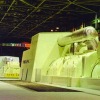- Metallurgy Machinery[12]
- Metal Casting Machinery[10]
- Tie Mounts[2]
- Other Machinery[6]
- Mining Machinery[2]
- Industrial Furnace[10]
- Power Distribution Equipment[1]
- Other Motor[7]
- Cleaning Equipment[2]
- Other Electrical Equipment[2]
- Electronics Production Machinery[1]
- Grinding Machine[1]
- Metallurgy Machinery Parts[1]
- Other Metallurgy Machinery[6]
- Other Machine Tools Accessories[7]
- Chemical Product Machinery[1]
- Rolling Mill[4]
- Mining Machinery Parts[7]
- Cooling Tower[5]
- AC Motor[3]
- DC Motor[4]
- Frame[7]
- Transformers[8]
- Packaging Tube[6]
- Boilers[7]
- Other Metal Processing Machinery[2]
- Testing Equipment[1]
- Graphite Electrodes[2]
- Cast & Forged[2]
- Other Metals & Metal Products[1]
- Diesel Generators[6]
- Spectrum Analyzers[4]
- Carbon Analyzers[3]
- Chemical Transportation Equipment[4]
- Pumps[3]
- Other Living Room Furniture[1]
- Other Home Decor[1]
- Furniture Handles & Knobs[2]
- Printing Inks[4]
- Copper Strips[3]
- Hoists[1]
- Contact Person : Mr. Robin Yan
- Company Name : Shanghai Electrical Machinery Group Co., Ltd.
- Tel : 86-21-60484485
- Fax : 86-21-59191323
- Address : Shanghai,Shanghai,218 Fengxian Road
- Country/Region : China
- Zip : 200041
stellite 20
The general lack of cobalt-based superalloy coherent strengthening phase, stellite 20 although the intensity of the low temperature (only 50-75% of nickel-based alloys), but higher than 980 °C, have high strength, good thermal fatigue, thermal erosion and abrasion performance, and has good weldability. Suitable for production of aviation jet engines, industrial gas turbines, marine gas turbine nozzle guide vanes and nozzle guide vanes and other engine. Cobalt carbide strengthening phase in high temperature alloy carbides is the main MC, M23C6 and M6C in the cast Stellite alloy, M23C6 is slow cooling, the grain boundaries and interdendritic precipitation. In some alloys, the small γ M23C6 formed with the eutectic matrix. MC carbide particles is too large, the dislocation can not have a significant direct effect, and thus little effect on alloy strengthening, while the dispersed carbide is a good strengthening effect. Located in the grain boundary carbides (mainly M23C6) can prevent grain boundary sliding, thereby improving the endurance strength, cobalt-based superalloy HA-31 (X-40) of the microstructure of dispersed strengthening phases (CoCrW) 6 C-type carbide. In some stellite alloy topology appears in the close-packed Laves phases such as sigma phase and is harmful, will become brittle alloy. Stellite alloy less intensive use of intermetallic compounds, as Co3 (Ti, Al) Co3Ta not stable at high temperatures, etc., but in recent years, intermetallic compounds with enhanced stellite alloy also developed. Stellite alloy carbides good thermal stability. Temperature increases, the carbides grow faster than the concentration of nickel-based alloys grew up in the γ phase is slower, re-dissolved in the matrix back to a higher temperature (up to 1100 °C), so the temperature rises, the Division is too Li alloy strength decreases generally slow.
stellite 20







